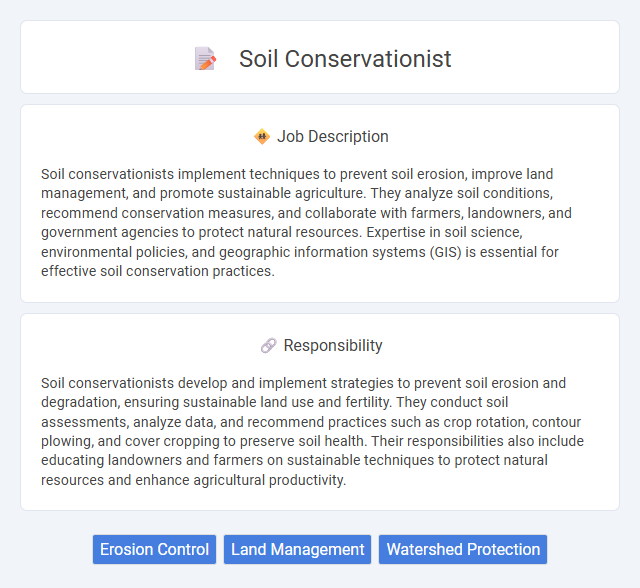
Soil conservationists implement techniques to prevent soil erosion, improve land management, and promote sustainable agriculture. They analyze soil conditions, recommend conservation measures, and collaborate with farmers, landowners, and government agencies to protect natural resources. Expertise in soil science, environmental policies, and geographic information systems (GIS) is essential for effective soil conservation practices.
Individuals with a strong interest in environmental science and a passion for sustainable land management are likely suitable for a soil conservationist role. Candidates who enjoy outdoor work, possess problem-solving skills, and have an aptitude for data analysis may find this career fulfilling and well-matched to their abilities. Those less comfortable with fieldwork or lacking a commitment to environmental stewardship might not find this position suitable.
Qualification
Soil conservationists typically require a bachelor's degree in soil science, environmental science, agriculture, or a related field, with many positions favoring candidates who hold a master's degree. Certification such as the Certified Professional Soil Scientist (CPSS) or Licensed Professional Soil Scientist (LPSS) enhances employment prospects, demonstrating expertise in soil management and conservation practices. Strong skills in data analysis, environmental regulations, and sustainable land use planning are essential qualifications for effective soil conservationists.
Responsibility
Soil conservationists develop and implement strategies to prevent soil erosion and degradation, ensuring sustainable land use and fertility. They conduct soil assessments, analyze data, and recommend practices such as crop rotation, contour plowing, and cover cropping to preserve soil health. Their responsibilities also include educating landowners and farmers on sustainable techniques to protect natural resources and enhance agricultural productivity.
Benefit
Soil conservationists likely contribute significantly to preserving soil health, which enhances agricultural productivity and prevents land degradation. Their expertise may help reduce erosion, improve water quality, and support sustainable land use practices. Employers and communities probably benefit from their efforts through increased crop yields and long-term environmental stability.
Challenge
Soil conservationists likely face the challenge of addressing soil erosion and degradation caused by climate change and human activities. They probably need to balance agricultural productivity with sustainable land management practices to prevent long-term soil damage. Managing limited resources while educating stakeholders on conservation methods could also pose significant difficulties in their role.
Career Advancement
Soil conservationists play a crucial role in managing land resources and preventing soil erosion, opening pathways for career advancement through specialized certifications in land management and environmental science. Gaining expertise in Geographic Information Systems (GIS) and sustainable agriculture methods significantly enhances job prospects and leadership opportunities within government agencies, environmental consulting firms, or non-profit organizations. Pursuing advanced degrees in environmental or agricultural sciences further positions soil conservationists for senior roles in research, policy development, or natural resource management.
Key Terms
Erosion Control
Soil conservationists specializing in erosion control develop and implement strategies to prevent soil degradation and loss on agricultural and natural lands. They utilize techniques such as contour plowing, terracing, and planting cover crops to stabilize soil and reduce runoff. Their work is critical in maintaining soil fertility, preventing sedimentation in waterways, and supporting sustainable land management practices.
Land Management
Soil conservationists specialize in land management practices aimed at preventing soil erosion, improving soil health, and promoting sustainable agricultural productivity. They analyze soil conditions, develop conservation plans, and implement techniques such as contour plowing, terracing, and cover cropping to maintain land fertility and reduce environmental impact. Effective soil conservation supports water quality, enhances crop yields, and preserves ecosystems across diverse landscapes.
Watershed Protection
Soil conservationists specializing in watershed protection implement strategies to prevent soil erosion, enhance water quality, and maintain sustainable land use within watershed areas. They conduct field assessments, develop conservation plans, and collaborate with local communities to restore natural vegetation and manage runoff effectively. Utilizing GIS technology and hydrological data, these professionals ensure the preservation of water resources vital for agriculture and ecosystem health.
 kuljobs.com
kuljobs.com